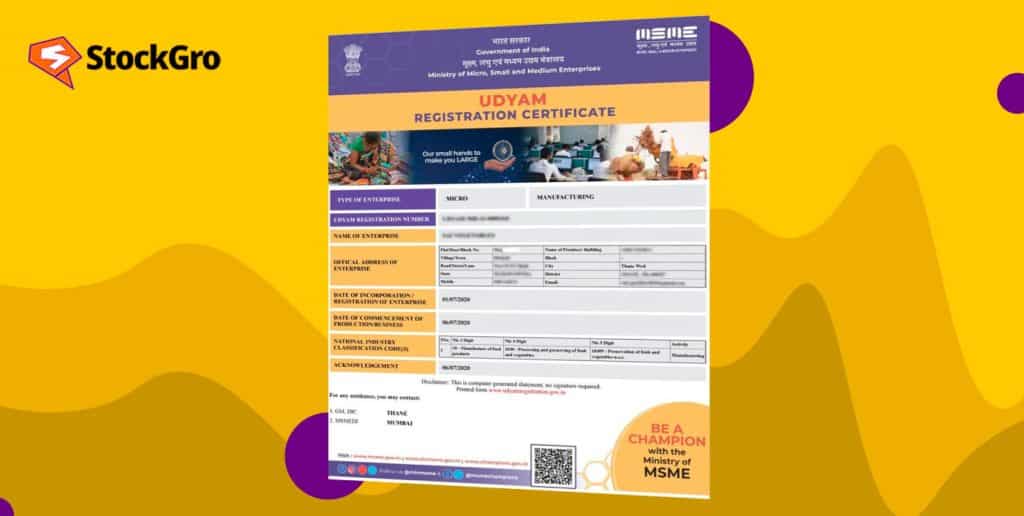
Micro, Small, and Medium Enterprises (MSMEs) are crucial to India’s economy. They account for an estimated 45-50% of the country’s business turnover. The MSME sector includes businesses that range from small-scale manufacturers to professional service providers.
The MSME Development (MSMED) Act of 2006 defines MSMEs in detail.
- A micro-enterprise is defined as one with a turnover of no more than ₹5 crore and an investment in plant, machinery, or equipment of no more than ₹1 crore.
- Small enterprises have an investment cap of ₹10 crore and a turnover limit of ₹50 crore.
- Medium enterprises can invest up to ₹50 crore and have a turnover up to ₹250 crore.
Udyam Registration is an online registration process for MSMEs in India launched by the Ministry of MSME. The objective is to streamline the registration procedure, hence facilitating firms’ access to a range of incentives and initiatives.
This blog aims to explain how small businesses can benefit from Udyam Registration.
Key features of Udyam Registration
- Fully digital process: There is no requirement for paper documentation because the MSME Udyam Registration process is fully conducted online. This makes it hassle-free and efficient.
- No cost involved: Registering on the Udyam Registration online portal is completely free. There are no charges or fees, making it accessible for all MSMEs.
- Single form submission: Businesses need to fill out only one Udyam Registration form, which simplifies the registration process and saves time.
- E-certificate with QR code: After registration, enterprises receive an online Udyam Registration certificate. A dynamic QR code on this certificate links to the enterprise’s information on the portal.
- Integrated with IT and GST systems: The system is integrated with Income Tax and GSTIN databases. Automatic data retrieval from government databases provides information on investment and turnover.
- Penalties for misrepresentation: Misrepresenting or suppressing information during registration can lead to penalties as specified under the MSMED Act, 2006.
- Single registration for multiple activities: An enterprise can include multiple activities, whether manufacturing or service, under one Udyam Registration.
You may also like: Top 5 challenges for MSME business loans
The importance of Udyam Registration certificate
Permanent identification
An Udyam Registration certificate serves as a permanent identification for your enterprise. It simplifies the process of accessing various government schemes and benefits, like the following:
- Prime Minister’s employment generation programme: In both rural and urban locations, this scheme offers financial support for the establishment of self-employment ventures. It offers subsidies ranging from 15-35% for projects in the non-farm manufacturing sector up to ₹50 lakh and in the non-farm service sector up to ₹20 lakh.
- Entrepreneurship and skill development programme: Aimed at promoting new enterprises and building capacity for existing MSMEs, this programme encourages entrepreneurial culture among current and aspiring entrepreneurs.
- International cooperation scheme: By enabling their participation in international fairs, conferences, seminars, and exhibitions, this programme assists small businesses in breaking into the export market.
Access to GeM and SAMADHAAN portals
With Udyam Registration, you can access the Government e-Marketplace (GeM) and the SAMADHAAN (Software Application for Monitoring And Disposal, Handling of Industrial Disputes/Claims/General Complaints) portal.
These portals are essential for participating in government procurement processes and addressing payment delays. Micro and small enterprises (MSEs), not medium enterprises, receive preferential treatment in terms of payment terms and interest on delayed payments. Customers are required to pay for goods or services within 15 days of receipt, extendable up to 45 days by mutual agreement.
Should payments be postponed above this time frame, the MSEs will be entitled to interest compounded monthly at three times the RBI-specified bank rate. This mandatory interest payment, which currently stands at about 20% per annum, ensures that MSEs are compensated for delayed payments, providing them with better cash flow management and financial security.
Priority sector lending
The Reserve Bank of India (RBI) has mandated banks to devote a portion of their lending to certain industries that are considered ‘priority.’ This initiative is known as priority sector lending (PSL).
Agriculture, MSMEs, export financing, housing, social infrastructure, education, and renewable energy are some of these industries. By being part of the PSL, MSMEs with a Udyam Registration certificate can access credit more easily and on favourable terms, which is crucial for their growth and sustainability.
Collateral-free loans
Udyam Registration facilitates collateral-free loans through the credit guarantee scheme for micro and small enterprises (MSE). This scheme offers a credit guarantee for loans up to ₹5 crore without requiring collateral or a third-party guarantee.
Simplified licensing
Obtaining licences, permits, and registrations becomes simpler with an Udyam certificate.It saves business owners time and effort by streamlining the compliance procedure.
Include waived fees for ISO certification, as well as reduced trademark and patent registration costs.
Tender procurement
The certificate helps in securing government tenders. It waives security deposits, making it easier and more cost-effective to bid for government projects.
Tax and utility concessions
Businesses are eligible for tax breaks as well as savings on their power and water costs. These benefits reduce operational costs, improving overall profitability.
Also read: Benefits of MSME
Requirements for MSME Udyam Registration
To register under Udyam, the primary documents required are the Aadhaar number and PAN card. These requirements ensure that businesses are compliant with tax regulations and can access various benefits.
While the GST number is generally required, there are exemptions based on the provisions of the Central Goods and Services Tax Act, 2017. Businesses should check if they qualify for these exemptions to streamline their registration process.
Also read: Empowering your business: The essential guide to MSME loan documents
Bottomline
Udyam Registration offers significant advantages for MSMEs, including easier access to credit, simplified compliance processes, and a range of financial benefits. By streamlining the registration process and integrating with government databases, it helps businesses focus on growth and development.
Small businesses can benefit greatly from the Udyam certificate, which gives them the assistance they need to prosper in a cutthroat industry.

